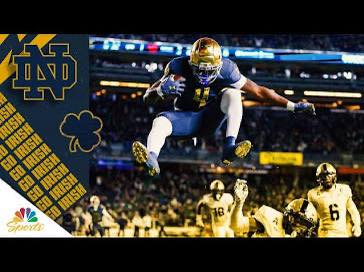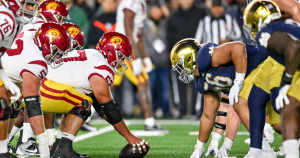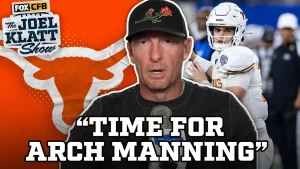
Everyone Agrees Jeremiah Love Is the Best Running Back in College Football and a Heisman Front-Runner, But He Won’t Get There Unless He Gets RB1 Reps and Is Treated Like the Star He Is
There’s no debate anymore—Jeremiah Love is the most electric, dominant, and complete running back in college football today. Whether you’re looking at raw stats, game-changing highlights, or just the eye test, Love checks every box. He’s fast, physical, elusive, patient, and has an innate ability to change the momentum of a game with a single touch. Analysts, fans, and even opposing coaches have acknowledged what many have known since last season: Jeremiah Love is that guy.
So, with all the talent in the world and an open runway toward the Heisman Trophy conversation, why is there still hesitation about his path to college football’s most prestigious individual honor?
The answer is frustratingly simple: reps. Love is undoubtedly the RB1 on his team in terms of talent and impact, but the way he’s being used doesn’t fully reflect that status. He isn’t consistently being treated like the focal point of the offense, and unless that changes soon, his Heisman case—regardless of ability—will struggle to stand on the numbers alone.
Let’s start with what’s already been proven. Jeremiah Love is the type of player you build a program around. His ability to break tackles, hit top speed in seconds, and read defenses makes him a nightmare for any coordinator. He’s also a complete back—he catches out of the backfield, blocks well in pass protection, and doesn’t shy away from physicality.
Every time he touches the ball, something special can happen. He doesn’t just rack up yards—he demoralizes defenses, tires them out, and flips field position like it’s nothing. He doesn’t need 25 carries to take over a game, but imagine what he could do with 25 carries.
If college football were a pure meritocracy based solely on skill, there’s no question Love would be leading the Heisman race. But the truth is, Heisman winners are often products of usage, narrative, and exposure.
Think about past winners at the running back position: Derrick Henry, Mark Ingram, Reggie Bush (technically, pre-vacated). What did they all have in common? They were the centerpiece of their teams’ offenses. They weren’t just talented—they were consistently fed the ball and relied upon in critical moments. That kind of usage builds stats, which build hype, which builds momentum in the Heisman race.
Love deserves that same treatment. It’s not enough to be the best back in the country. He has to be used like the best back in the country.
Love is producing, yes, but he’s doing it on limited touches. And while that speaks volumes about his efficiency and explosiveness, it won’t be enough for Heisman voters who still care deeply about traditional metrics—total rushing yards, total touchdowns, yards per game, etc.
Efficiency is impressive, but volume tells a bigger story to voters. If Love is splitting carries too often or being held back in low-stakes games, he’ll finish the season with numbers that don’t reflect his true impact. That’s not a knock on him—it’s a knock on how he’s being deployed.
If the coaching staff truly sees him as RB1—and there’s every reason they should—they need to treat him like it. That means 20+ touches per game, goal-line opportunities, and designed plays that get him in space. This isn’t about padding stats. It’s about maximizing your best player and putting him in a position to be recognized for what he is.
A team’s offensive identity is built around its most reliable weapon. Right now, the team has a golden opportunity to define itself through Jeremiah Love. The benefits go beyond Heisman hype. When your offense flows through a dominant back, everything else opens up—play action becomes lethal, third downs become more manageable, and time of possession swings in your favor.
Building the offense around Love isn’t just smart for his individual accolades—it’s the best path to team success. And as we know, team success often amplifies Heisman campaigns. A star running back on a playoff-contending team? That’s the recipe voters can’t ignore.





